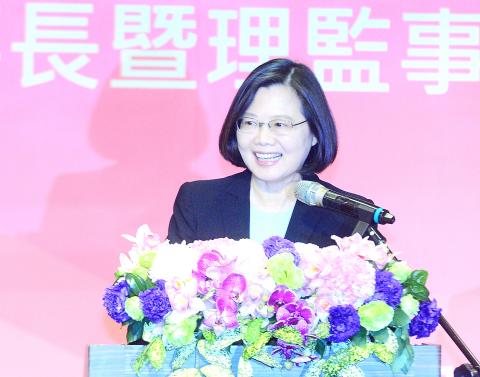President Tsai Ing-wen (蔡英文) said in a recent interview with CNN that her decision on whether to accept an invitation to address the US Congress would depend on three major considerations.
While ties with the US improved after US President Donald Trump took office in January 2017, in the interview with CNN correspondent Matt Rivers on Monday, Tsai said that it was not a simple decision to make and would require “comprehensive consideration.”
“From our perspective, would we accept such an invitation if it were extended? We would have to look at it from several angles,” Tsai said.

Photo: Wang Yi-sung, Taipei Times
Tsai laid out three major considerations: “Would delivering an address in Washington DC be in the interests of Taiwan, benefit Taiwan-US relations, and serve peace and stability in the region?”
On Feb. 7, a group of US senators wrote a joint letter to US House of Representatives Speaker Nancy Pelosi, calling on her to invite Tsai to address a joint session of the US Congress.
The letter was signed by Cory Gardner, Marco Rubio, Tom Cotton, John Cornyn and Ted Cruz.
Some US politicians have opposed the proposal, with former American Institute in Taiwan chairman Richard Bush saying that it was flawed, as it would not be conducive to US relations with China and would hurt Taiwan.
Former US deputy assistant secretary of state Susan Shirk even said the proposal was a “huge mistake,” adding that it would be highly irresponsible for Trump to use Taiwan as leverage in dealing with China.
Tsai, who came to power in May 2016, also said in the interview that she intended to seek re-election next year.
According to CNN, Tsai, throughout the interview, painted the picture that Taiwan was facing down the growing might of China.
Last month, Chinese President Xi Jinping (習近平) called for the peaceful unification of China and Taiwan, but declined to discount the use of force.
“Chairman Xi Jinping’s New Year’s address alerted Taiwan to the fact that its independent existence could be changed, because Xi has started to talk about unification and the ‘one country, two systems’ concept,” Tsai told CNN.
When asked “if China invaded tomorrow, would you count on the US military to be there?” Tsai said that Taiwan has been strengthening its military capability.
“Our defenses are well-prepared for an attack at any time — for any situation where we would need to fend China off for 24 hours,” Tsai said. “So we would hope that after withstanding any first wave of attacks ourselves, other countries throughout the world would stand up in unison and put strong pressure upon China in response.”

Taipei has once again made it to the top 100 in Oxford Economics’ Global Cities Index 2025 report, moving up five places from last year to 60. The annual index, which was published last month, evaluated 1,000 of the most populated metropolises based on five indices — economics, human capital, quality of life, environment and governance. New York maintained its top spot this year, placing first in the economics index thanks to the strength of its vibrant financial industry and economic stability. Taipei ranked 263rd in economics, 44th in human capital, 15th in quality of life, 284th for environment and 75th in governance,

Greenpeace yesterday said that it is to appeal a decision last month by the Taipei High Administrative Court to dismiss its 2021 lawsuit against the Ministry of Economic Affairs over “loose” regulations governing major corporate electricity consumers. The climate-related lawsuit — the first of its kind in Taiwan — sought to require the government to enforce higher green energy thresholds on major corporations to reduce emissions in light of climate change and an uptick in extreme weather. The suit, filed by Greenpeace East Asia, the Environmental Jurists Association and four individual plaintiffs, was dismissed on May 8 following four years of litigation. The

A former officer in China’s People’s Liberation Army (PLA) who witnessed the aftermath of the 1989 Tiananmen Square massacre has warned that Taiwan could face a similar fate if China attempts to unify the country by force. Li Xiaoming (李曉明), who was deployed to Beijing as a junior officer during the crackdown, said Taiwanese people should study the massacre carefully, because it offers a glimpse of what Beijing is willing to do to suppress dissent. “What happened in Tiananmen Square could happen in Taiwan too,” Li told CNA in a May 22 interview, ahead of the massacre’s 36th anniversary. “If Taiwanese students or

The New Taipei City Government would assist relatives of those killed or injured in last month’s car-ramming incident in Sansia District (三峽) to secure compensation, Mayor Hou You-yi (侯友宜) said yesterday, two days after the driver died in a hospital. “The city government will do its best to help the relatives of the car crash incident seek compensation,” Hou said. The mayor also said that the city’s Legal Affairs, Education and Social Welfare departments have established a joint mechanism to “provide coordinated assistance” to victims and their families. Three people were killed and 12 injured when a car plowed into schoolchildren and their